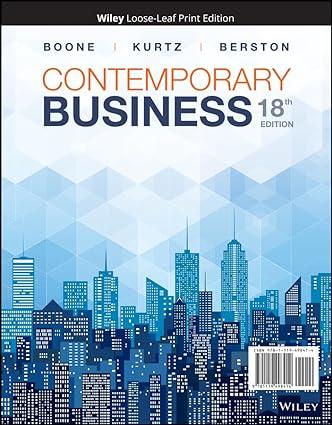A Zipster is one of over a million members of the world's largest car-sharing service, Cambridge, Massachusettsbased
Question:
A Zipster is one of over a million members of the world's largest car-sharing service, Cambridge, Massachusetts–based Zipcar. The company was founded in 2000 by two moms, Antje Danielson and Robin Chase, who met when their children were in school together. Today, Zipcar is owned by Avis Budget and offers self-serve, ondemand automobile reservations by the hour or day to three distinct customer segments: city dwellers, business people, and college students. Using various marketing channels and promotional activities, Zipcar targets each segment using a slightly different approach.
Zipcar employs several forms of advertising to inform, persuade, and remind, but the most effective approach is direct and personalized. Based on demographic information, the company uses technology to find the right target audiences to deliver the most timely and relevant messages. For example, Zipcar uses social media to market to college and university students with a message about the benefits of picking up and driving a Zipcar on or nearby campus and reserving a car using a mobile device or the web. The message to college students centers on the convenience and ultimate benefit of being a Zipster, when considering the expense of owning and maintaining a car while still in school. For city dwellers, Zipcar's marketing focus is on running errands or getting out of the city for a daylong excursion.
Not everyone understands how Zipcar's service works. From an advertising perspective, the company has discovered the effectiveness of direct-response TV, which is TV advertising purchased on a national basis that appears in local markets.
This approach has proved valuable to Zipcar's marketing mix. TV commercials are used to build awareness and inform users about how the service works. Unlike a traditional car rental service, Zipcar is based on the use of technology. Zipcar members have automated access to rentals using a “Zipcard,” which works with the car's technology to unlock the door so customers can locate the keys inside the car.
While there are annual membership fees and hourly rental rates, gas, parking, insurance, and maintenance are included.
Outdoor and Internet advertising strategies are effective for marketing Zipcar's services. For those looking online for car rentals, Zipcar's search engine optimization is leveraged on Twitter, YouTube, Facebook, and other social media sites. In the early days of the company, promotional events included brand ambassadors from its field marketing organization (on college or university campuses, for example) to educate and inform students about Zipcar's benefits. In mature markets like New York and Boston, the marketing message focuses more on reminding users about Zipcar's value and less about educating and informing. In markets where car sharing is a new concept for most consumers, the promotional strategy centers on informing and differentiating Zipcar from competitors, mainly rental car companies and other modes of transportation.
Zipcar pursues multiple promotional objectives simultaneously. Recently the company collaborated with JetBlue to provide services for the airline's customers traveling to specific destinations. To empower and collaborate among its own community members, Zipcar will be distributing up to $100,000 in free driving to 40 nonprofit organizations.
Zipcar's Chief Marketing Officer oversees membership, which is an integral part of the company's marketing efforts. Zipcar's field marketing representatives show up at farmer's markets, public transportation stations, and companies located in the city to educate and promote its value proposition and the benefits of its brand. Marketing strategies are developed around the seasonality of Zipcar's business, which varies between summer and winter months in each of its market segments.
To remain competitive, Zipcar carefully analyzes how it prices its services. Determining the pricing strategy for Zipcars located in a local city is actually a fairly complex process. With more than 12,000 vehicles across the globe, at 50 airports, and over 30 cities around North America, pricing varies by market. For example, in Boston where the company is headquartered, pricing begins at $8.25 per hour. There is a onetime application fee to become a member, and various pricing plans are available depending on customers' needs and the type of vehicles available in each of its markets.
Zipcar remains a lifestyle brand, and the customer experience remains the company's most valuable marketing tool. So whether it's a car to run errands or to enjoy a night on the town, pricing will vary, but the customer experience remains the same. Using Zipcar allows you to avoid paying for gas or visiting the auto repair shop. That's clearly something worth advertising.
Questions for Critical Thinking
1. Discuss and provide examples of the different types of marketing channels and promotional activities Zipcar uses to target each of its three user segments. As marketing manager at Zipcar, discuss additional promotional strategies you would employ for each of the market segments.
2. Discuss how Zipcar is more a lifestyle brand than a travel brand, and what this means. How does this impact the company's promotional efforts? What solutions does Zipcar provide, and how does this make it a lifestyle brand?
3. Who are Zipcar's competitors, and how do their promotional and advertising efforts compare? Do competitors vary for each of Zipcar's distinct market segments? What transportation options are there for each of the three segments?
4. Go online and perform additional research to learn more about Zipcar's pricing structure in your local market. Using pricing objectives discussed in the chapter (profitability, volume, meeting competition, and prestige), how would you evaluate Zipcar's pricing objectives? Provide examples.
Step by Step Answer:

Contemporary Business
ISBN: 9781119498414
18th Edition
Authors: Louis E. Boone, David L. Kurtz, Susan Berston





